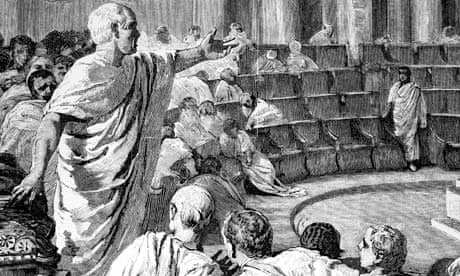There's a new literary genre on the rise. Actually, it's an old one, with deep classical roots, whose masters have names like Demosthenes, Mark Antony, Pericles and Cicero. I'm talking about speeches, which are back in vogue.
In politics, there is, of course, never any shortage of speeches: Obama, Clinton, Cameron etc. And then further back, Reagan, Kennedy, Martin Luther King, Churchill, Lloyd George, Nye Bevan and so on. But I'm struck by the upsurge in the contemporary appetite not just for making, but also for listening to, speeches long and short.
I was watching the Thatcher "debate" in Westminster last week when I had this undersized Eureka moment. Speeches: the public, unguarded personal expression of feeling and opinion. Everyone's doing it; and it's become part of the spirit of the age.
Consider this contrast. When Churchill died, the House of Commons gathered to listen to just four eulogies. The whole thing took less than an hour. Last week, MPs were speaking all day. For and against. On and on. When the proceedings were brought to a close, 70-odd speakers had addressed their colleagues during an astonishing seven-and-a-half-hour gabfest. And some of them still felt cut short.
Literary speeches are on the up, too. Every book prize now has its quota of rhetoric, and most book parties as well. I've been to three book launches in recent weeks. In one, my neighbour at the back of the room turned to me and said, "What does she (the author) think this is? A wedding?" The bashful biographer/novelist/poet, launching her own book, had been speaking for about 15 minutes.
At another book launch last month, the contented writer spoke so long that his guests began to peel away into the night in search of silence and solitude.
From the Booker prize, to renew the literary reference, the speech that sticks in my memory, though it passed little noticed was James Kelman's speech when he won in 1994 with How Late It Was How Late. Apparently impromptu, Kelman stood up and delivered a brilliant cri de coeur for glories of the Scots language and its literature, denouncing en passant the cultural supremacy of the English language.
The contemporary enthusiasm for live performance, and many other cultural factors, mostly to do, I think, with the need for self-expression, lies behind this new-old genre. It can only be a matter of time before someone starts a speech-fest, dedicated to the art and practice of rhetoric. Then the wheel will have come full circle. There are only so many genres in literature. It's certainly time that the Speech got its moment.

Comments (…)
Sign in or create your Guardian account to join the discussion